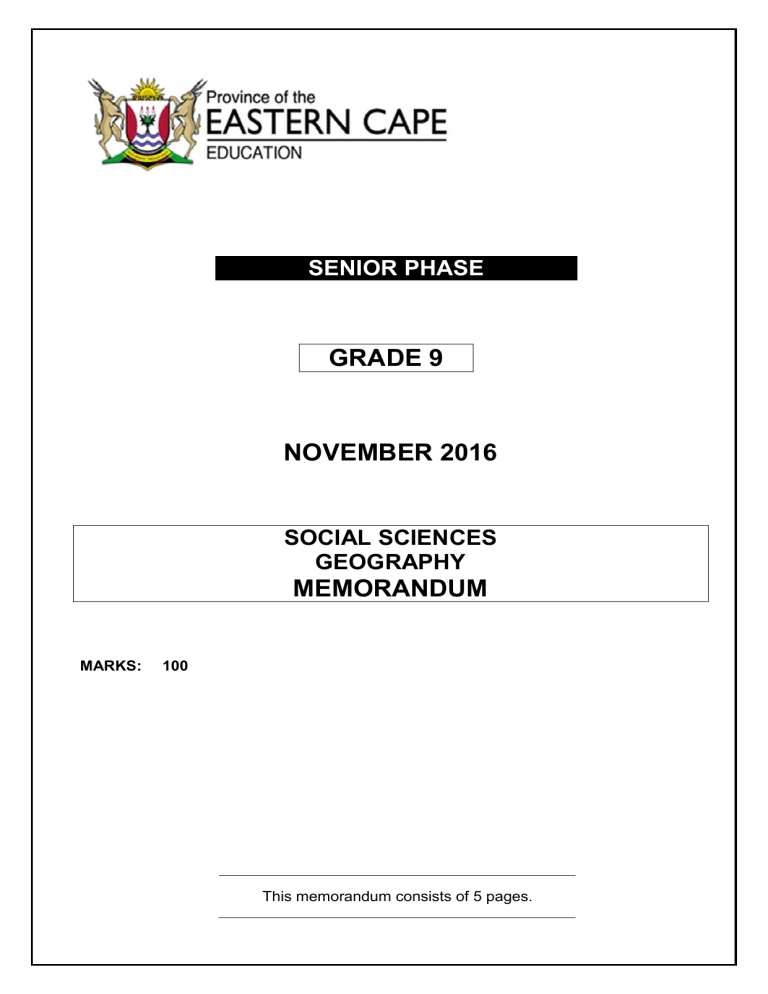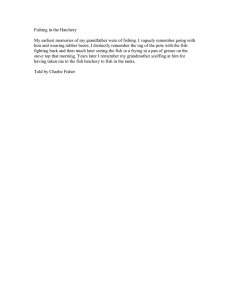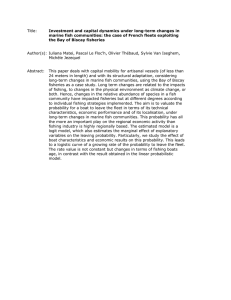
SENIOR PHASE GRADE 9 NOVEMBER 2016 SOCIAL SCIENCES GEOGRAPHY MEMORANDUM MARKS: 100 This memorandum consists of 5 pages. 2 SOCIAL SCIENCES (GEOGRAPHY) (EC/NOVEMBER 2016) QUESTION 1: MAPWORK 1.1 MULTIPLE-CHOICE QUESTIONS 1.1.1 1.1.2 1.1.3 1.1.4 1.1.5 1.1.6 A D A C D A 34°S: a latitudinal reference. river valley. 126 m. Golf course meandering channel pattern. there is deposited sediment in the river channel. (1 x 2) (1 x 2) (1 x 2) (1 x 2) (1 x 2) (1 x 2) (2) (2) (2) (2) (2) (2) 1.2 MAPWORK TECHNIQUES AND CALCULATIONS 1.2.1 North-easterly direction √√ (1 x 2) (2) 1.2.2 56º √√ (1 x 2) (2) 1.2.3 Method 1: 4,7 cm √ x 50 000 √ 100 000 √ = 2,35 km √ Method 2: OR 4,7 cm ÷ 2 √√ = 2,35 km √√ (4) 1.3 MAP INTERPRETATION AND ANALYSIS 1.3.1 One advantage: Clean energy, √√ less greenhouse gases emitted, √√ reduces reliance on coal-powered energy stations, √√ allows for localised generation of energy √√ (Any 1 logical choice). (Any 1 x 2) (2) One disadvantage: Noise of spinning turbines, √√ takes up space, √√ can cause the death of flying birds and bats, √√ looks unsightly, spoils the view √√ (Any 1 logical choice) (1 x 2) (2) (a) Low-income residential √ (1) (b) Small properties, √√ houses are small, √√ houses are built close together. √√ (Any 1 logical choice) (Any 1 x 2) (2) Good infrastructure (roads, railway lines), √√ windpumps and furrows for the provision of water, √√ windbreaks to protect field from prevailing winds, cultivated lands divided into camps, farms have names. √√ (Any 2 logical choices) (Any 2 x 2) (4) A B 1.3.2 1.3.3 1.3.4 Preservation of fauna and flora (biodiversity), √√ filtering waste, √√ absorbs flood water, √√ recreational purposes. √√ (Any 2 logical choices) (Any 2 x 2) Copyright reserved (4) [35] Please turn over 3 SOCIAL SCIENCES (GEOGRAPHY) (EC/NOVEMBER 2016) QUESTION 2: SURFACE FORCES THAT SHAPE THE EARTH AND DEVELOPMENT ISSUES 2.1 PROCESSES 2.1.1 2.1.2 2.1.3 2.1.4 2.1.5 Exfoliation √ Attrition √ Hydraulic action √ Deflation √ Abrasion √ (1) (1) (1) (1) (1) 2.2 FEATURES OF EROSION 2.2.1 A B C D E Arch √ Ox-bow lake √ Barchan dune √ Cirque √ Wave-cut platform √ (1) (1) (1) (1) (1) 2.2.2 A B C D E Wave action along the coast. √ River action or surface runoff √ Wind action √ Moving ice or glacier movement √ Wave action along the coast √ (1) (1) (1) (1) (1) 2.3 SOIL EROSION 2.3.1 2.3.2 2.3.3 2.3.4 Removal of soil √ by forces of erosion such as running water and wind. √ (2) Agricultural production declined, √ the number of daily meals have declined √ and the quantity of food per meal has declined. √ (Any 1 explanation from the text) (Any 1 x 1) (1) Overgrazing, √√ over-cultivation, √√ deforestation, ploughing across contour lines, √√ over-use of pesticides and herbicides. √√ (Any 2 logical choices) (Any 2 x 2) (4) A B Copyright reserved Reduce soil erosion To limit tilling of the soil, √√ crop rotation, √√ stock rotation, √√ reforestation, √√ cultivation parallel to contour lines to limit runoff, √√ constructing anti-erosion walls √√, use of windbreaks. √√ (Any 2 x 2) (4) Improve agricultural production To genetically manipulate seed varieties, √√ greenhouses and plastic tunnels, √√ permaculture or hydroponics, √√ use of naturally occurring methods to curb pests, √√ education of farmers, √√ to use a variety of compatible plant species, √√ raintanks, drip-irrigation, √√ use of appropriate technology that the people can understand and afford. (Any 2 logical choices to improve small-scale cultivation) (Any 2 x 2) (4) Please turn over 4 2.4 SOCIAL SCIENCES (GEOGRAPHY) (EC/NOVEMBER 2016) UNFAIR TRADE AND AID PROVISION PRACTICES 2.4.1 2.4.2 2.4.3 2.4.4 2.4.5 Less Economically Developed Countries (LEDC) or developing countries. √ (Do not accept poor countries) (1) More Economically Developed Countries (MEDC) or developed countries.√ (Do not accept rich countries) (1) The tree trunk has been processed into planks which are now easier to use and therefore are more valuable. √√ (1 x 2) (2) The poor man provided the resource √. Once the resource was processed the poor man had to buy it back from the rich man at a higher cost. √ As the poor man could not afford the chicken sheds the rich man said he would help the poor man by giving him a loan. The poor man is then charged interest and is in debt. √ The rich man then has the monopoly of the resource which he can buy at fixed prices. √ The poor man has no choice and has to trade with the rich man because of his debt. √ (Any logical choice from the text) (Any 1 x 2) (2) Fair trade: To develop more equitable relationships between developed and developing countries: To create opportunities for economically disadvantaged producers, √ fair trade is open to all. √ To improve managerial skills and open up market opportunities for the producers, √ pay a fair price for a resource, √ sustainable environmental practices and responsible methods of production. √ (Any 2 logical choices) (Any 2 x 2) (4) [40] QUESTION 3: SUSTAINABLE USE OF RESOURCES 3.1 SUSTAINABLE VERSUS UNSUSTAINABLE LINE FISHING PRACTICES IN SOUTH AFRICA 3.1.1 3.1.2 Unsustainable fishing (concept): irresponsible fishing, √ to not limit the amount and size of fish species caught, √ to not preserve future fish supplies. √ (Any 2 x 1) (2) By informing consumers √ by using different colours √ of which fish species is in plentiful supply and can be eaten (green colour). Those species that are threatened (orange) and those that are endangered (red colour) should not be eaten. √ This helps the consumer to make responsible choices√ when purchasing fish. (Any 3 explanations) (Any 3 x 1) (3) Copyright reserved Please turn over (EC/NOVEMBER 2016) 3.1.3 3.1.4 3.2 5 SOCIAL SCIENCES (GEOGRAPHY) A Over-fishing or commercial line fishing √√ (Any 1 x 2) (2) B Large-scale commercial fishing√√ Use of illegal fishing methods, for example, the use of gill nets √√ (Any logical choice) (Any 1 x 2) (2) Limits set on the number of boats and their catch capacity,√√ limits set to catch only certain species in an area, √√ areas where fishing can take place are monitored those breaking the law are fined, √√ Marine Protected Areas (MPA’s) to allow fish to breed, √√ only certain size limits are allowed, √√ mesh size of nets must allow immature fish to escape. √√ (Any 2 logical choices) (Any 2 x 2) (4) GREENHOUSE GAS EMISSIONS (GIVEN OFF) FROM ELECTRICITY PRODUCTION 3.2.1 3.2.2 3.2.3 Greenhouse gases: gases in the atmosphere that absorb and retain heat √ in the Earth’s atmosphere. √ (2 x 1) (2) AND/OR Global warming: An increase in greenhouse gases√ is causing a rise in atmospheric temperatures. √ This is called global warming. (2 x 1) (2) AND/OR Climate change: Global warming is causing a change in normal weather patterns √ over time bringing about climatic change. √ (2 x 1) (2) AND/OR Carbon footprint: amount of carbon emissions √ each person, according to their life-styles, is responsible for. √ (2 x 1) (2) Max. (Any 2 x 2) A B C Coal-fired power stations √ Nuclear power √ Nuclear power √√ (1 x 2) (4) (1) (1) (2) Carbon taxes: fining businesses as punishment for releasing carbon emissions √√, use of low-carbon technologies that release less carbon, √√ LED and fluorescent light bulbs, educate people about the intelligent use of electricity, √√ implement a solar-water geyser programme, turn electrical appliances off at the wall when not in use. (Any 2 logical choices) (Any 2 x 2) (4) [25] TOTAL: 100 Copyright reserved Please turn over

